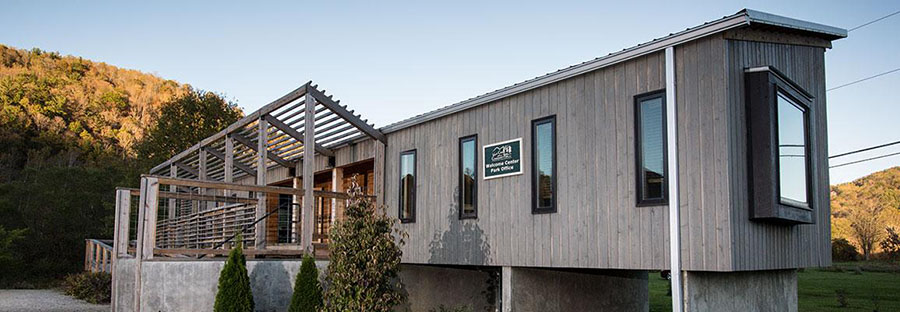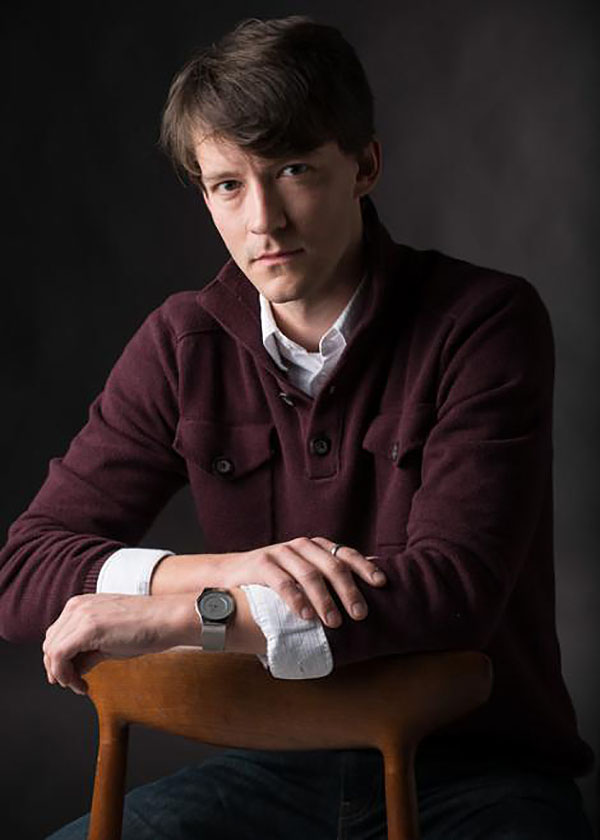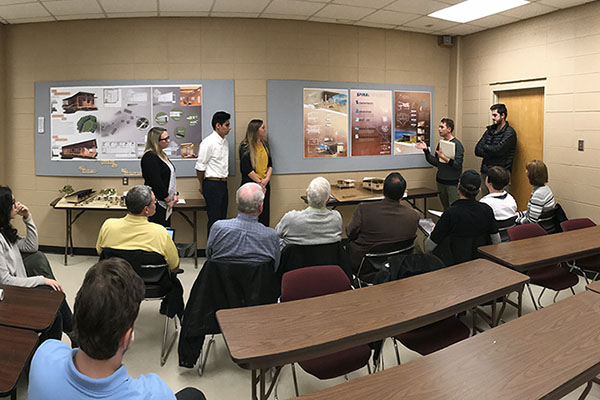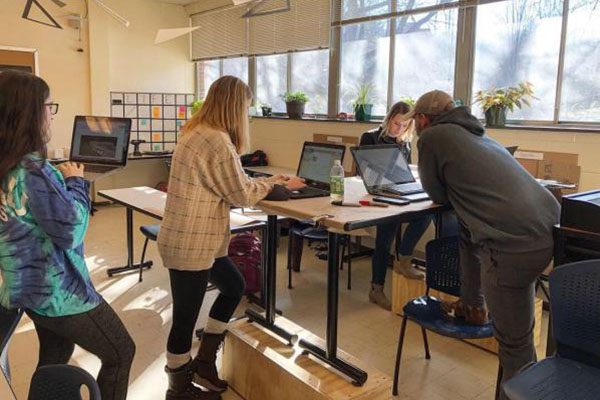BOONE, N.C. — D. Jason Miller, associate professor in Appalachian State University’s Department of Sustainable Technology and the Built Environment (STBE), is the recipient of a 2019 University of North Carolina Board of Governors Excellence in Teaching Award. He will receive a commemorative bronze medallion and a $12,500 cash prize during Appalachian’s spring commencement ceremony.
Dr. Darrell P. Kruger, Appalachian’s provost and executive vice chancellor, remarked, “D. Jason Miller brings a high standard of teaching into his classroom through experiential learning techniques that will provide a lasting impact and transform the lives of his students.”
One faculty member from each of North Carolina’s 16 public universities and one from the North Carolina School for Science and Mathematics are granted this prestigious recognition, now in its 25th year.
“This award is an opportunity to acknowledge the great work that’s being done by some of the finest instructors in all of higher education,” said UNC System Interim President Bill Roper.
The Board of Governors also selected six other Appalachian faculty members to receive awards during spring commencement. The instructors were chosen after being nominated by fellow faculty or Appalachian students, administrators or alumni for their innovative teaching methods in the classroom, making a difference in the way students learn.
Dr. Holly Hirst, professor in the Department of Mathematical Sciences, is the recipient of the Appalachian State University Excellence in Teaching Award with a $1,500 prize.
The winners of the Appalachian State University School/College Awards, worth $1,000 each, are:
- Dr. Peter Nelsen, associate professor in the Department of Leadership and Educational Studies.
- Dr. Alecia Jackson, professor in the Department of Leadership and Educational Studies.
- Lillian Nave, senior lecturer in the First Year Seminar program, a division of University College.
- Dr. Ken Brackney, professor in the Department of Accounting.
- Dr. Timothy Smith, professor in the Department of Anthropology.
Miller’s path to teaching
Miller teaches what he practices — and practices what he teaches. He is a licensed architect with his own design firm, David Jason Miller Architect PLLC, and integrates lessons from his professional work into the classroom experience, collaborating with community and industry partners to engage students in real-world projects.
In his career path, Miller didn’t set out to teach but recognized he may have had the latent desire to do so. “When I was in graduate school, I spent as much time helping my classmates with their projects as I did working on my own projects,” he said. “I’ve always had an interest in looking at the ideas of others and helping them to optimize those ideas.”
In addition, Miller has teaching in his blood: his mother was an instructor at Caldwell Community College and Technical Institute.
“She provided a model for me of consistent dedicated effort and hard work on behalf of her students, who loved and respected her because she put so much effort into their success. As a child and even as a disgruntled teenager, her work seemed noble to me,” he shared.

Under D. Jason Miller’s leadership, students in Appalachian’s IDEXlab program plan, design, build and commission real projects for real clients — such as this visitor welcome center at the Valle Crucis Community Park. Sponsors cover the cost of materials for projects designed and built by the IDEXlab. Photo submitted
Miller earned his B.A. in art history and history from Washington and Lee University and his Master of Architecture from North Carolina State University. He was employed by GLUCK+, an award-winning, architect-led design–build firm in New York City, when, in 2008, he was assigned to work on a custom residential job site in Watauga County, where he grew up.
“One of my former classmates from NC State, Chad Everhart, was then an assistant professor in Appalachian’s building sciences program, and he asked me to teach a class in the evening on commercial building design,” Miller said.
Miller taught more classes the following semester, and when the GLUCK+ project was complete, he decided to change his course and teach while starting his own practice locally.
“I use the classroom to energize my professional practice, and I use the professional practice to bring relevance to the classroom,” Miller explained. “I work on a variety of design projects and collaborate actively with other local design professionals. Maintaining a connection to my profession helps me bring some gravitas to the subject matter in the classroom.”
Real-world projects
Miller does more than share his professional expertise with his students — he brings his clients and challenging projects into the classroom through sponsored studios. “I want students to work with real clients as much as possible,” Miller said. “Rather than having a faculty member describe what the architecture should be, I want the students to respond to the type of audience they’ll most often have to respond to — the audience that receives their work and pays them.”
Projects commissioned in the studios are often for local government agencies and nonprofit organizations. Cost of materials are covered by the companies or sponsors, and the design and construction work is done by students at no charge, providing a service to community groups that might not be able to afford the services otherwise.
Phyllis Kloda, dean of Appalachian’s College of Fine and Applied Arts, said, “Jason is breaking traditional barriers by working with colleagues to create an innovative experience for students that spans the entire academic year. His Integrative Design Experience Laboratory (IDEXlab) course incorporates a design thinking approach and this, paired with his entrepreneurial spirit, are key components driving his teaching and the unique experience he provides for students.”
The IDEXlab is a nontraditional curriculum program in which students receive course credit for participating in their concentration to plan, design, build and commission real projects for real projects.
“Students get a hyper-professional experience, where their roles and responsibilities are wide ranging. They’re getting education by doing, and it sets them up for success as they seek professional positions or apply to graduate programs,” Miller said.
He said he treats the classroom as he would an architectural practice. “I see myself as a facilitator, not a gatekeeper. When students ask questions or have ideas, it isn’t my job to tell them how they must do it, but to help them figure out ways they can do it.”
Miller served as a principal faculty advisor for The Solar Homestead and Maison Reciprocity, Appalachian’s highly successful entries to the 2011 U.S. Department of Energy Solar Decathlon in Washington, D.C., and the Solar Decathlon Europe 2014. These net-zero energy residential projects garnered the university attention on national and international stages.
“He completely devoted himself to the betterment of our learning and success, but importantly did not do the work for us,” said Appalachian alumnus Bill Pfleger ’04 ’06 ’13, one of Miller’s former students who is now a solutions architect manager for Schneider Electric in Nashville, Tennessee. “Instead, he was a guiding voice — the person that challenged us in the way he knew our competition judges would.”
A team effort
The Excellence in Teaching Award exemplifies the value of the team approach to education, Miller said. “I don’t operate in a vacuum. I have dedicated faculty colleagues, people who have encouraged me and have worked alongside me to realize the transformative learning experiences we’ve been able to achieve.”
Miller continued, “To be a successful instructor, you have to possess energy and a willingness to collaborate with people who are motivated. You have to have the support of fellow faculty, administration, and students. The recognition of this award, to me, is the recognition of a team.”
What do you think?
Share your feedback on this story.
About the Department of Sustainable Technology and the Built Environment
One of seven departments housed in the College of Fine and Applied Arts, the Department of Sustainable Technology and the Built Environment at Appalachian State University features an integrated array of programs spanning the fields of sustainable design and technology. Its mission is to foster a strong and vibrant culture of inquiry, discovery and innovation that integrates theory with application, problem seeking with problem-solving, local issues with global perspectives and technological progress with environmental stewardship. It offers bachelor’s degrees in sustainable technology and building science, and a master’s degree in technology. Learn more at https://stbe.appstate.edu.
About the College of Fine and Applied Arts
Appalachian State University’s College of Fine and Applied Arts is a dynamic and innovative group of seven academic departments, bringing together a variety of perspectives, experiences and real-world education to provide unique opportunities for student success. The college has more than 3,500 undergraduate and graduate majors. Its departments are Applied Design, Art, Communication, Military Science and Leadership, Sustainable Development, Sustainable Technology and the Built Environment, and Theatre and Dance. Learn more at https://cfaa.appstate.edu.
About Appalachian State University
As a premier public institution, Appalachian State University prepares students to lead purposeful lives. App State is one of 17 campuses in the University of North Carolina System, with a national reputation for innovative teaching and opening access to a high-quality, cost-effective education. The university enrolls more than 21,000 students, has a low student-to-faculty ratio and offers more than 150 undergraduate and 80 graduate majors at its Boone and Hickory campuses and through App State Online. Learn more at https://www.appstate.edu.





![How NCInnovation Is Rethinking Economic Development in North Carolina [faculty featured]](/_images/_posts/2026/02/rethinking-economic-development-600x400.jpg)








